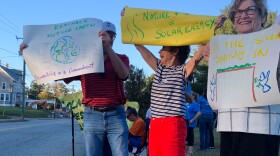"Candidates should be aware that talking about global warming solutions may give them an edge in the upcoming election."
Geoff Feinberg
With the gubernatorial election one week away, lots of issues are on the minds of voters: the economy and jobs, taxes, gun policy, and education -- but what about climate change?
For voters, climate change ranks among the least important issues this election cycle. According to a recent national poll from Gallup, it's behind everything: jobs, abortion, government spending, immigration, and yet: "Candidates should be aware that talking about global warming solutions may give them an edge in the upcoming election," said Geoff Feinberg, research director for the Yale Project on Climate Change Communication.
Feinberg's group surveyed hundreds of voters and found that a candidate's views on climate change could be a key factor in capturing something every politician wants: the swing vote. Swing votes will be important in this year's tight race between Governor Dannel Malloy and republican challenger Tom Foley. "The polling is very clear," Feinverg said. "It shows that a majority of Americans do think global warming is happening. The majority of Americans want action on it."

His group found that swing voters, particularly independents and moderate Republicans, are much more likely to support a candidate calling for action to curb global warming than one who is not, and that registered voters are three times more likely to vote against a political candidate who opposes action to reduce global warming.
"It's really up to the candidate to decide whether to make it an issue," said Jim Greenwood, a former Republican congressman who now serves on the board of directors for the national Audubon Society. "Whether you believe in man-made climate change or not," he said, "there are so many good reasons to reduce our reliance on fossil fuels -- environmental reasons; strategic reasons; military strategic reasons; the ability to create new jobs from sustainable energy sources. We all ought to be able to get on board for those reasons, regardless of your opinion on man-made climate change."
Here in Connecticut, what do the candidates think?

Speaking on WNPR'sWhere We Live, Tom Foley said he believes global temperatures are climbing. "We need to respond to those impacts," he said, "if it's going to affect our shorelines; if it's going to affect the weather; if it's going to affect the number of storms and hurricanes we get here. A governor has to respond to those things, but Connecticut isn't, on its own, going to solve global warming."
Asked about the cause of global warming, Foley said, "I think that the man-made activity contributes to it, but how much, and whether there's anything that we can do about it or not, I really don't know."
During a debate in New London, Independent candidate Joe Visconti said he also believes climate change is happening, but that he's unsure about the cause.
Malloy said he thinks it’s due to human activity. "Of course climate change is real," he said. "Of course it's beaten us up. Of course it's cost us money, and to deny that is to deny reality."
But if an opinion on climate change could potentially capture a swing voter, are the candidates campaigning effectively around the issue? "Not so much," said Gary Yohe, professor at Wesleyan University. Yohe was vice chair for President Barack Obama's National Climate Assessment. "I think a lot of the campaigning in Connecticut has been defined by jobs and economics and misstatements on one side or the other about what is happening," he said. "The impacts of climate change and the economics of climate change have not been elevated to the same level."
Yohe said he thinks the issue will play a much bigger role in the 2016 election, as the Obama administration continues its push to reduce carbon emissions 30 percent by 2030.





